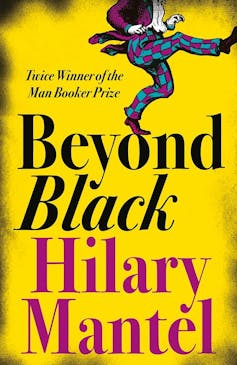Conversing with the 'restless dead' – a posthumous collection of Hilary Mantel's writing illuminates her singular literary achievement
- Written by Lisa Fletcher, Professor, University of Tasmania

Hilary Mantel’s writing career falls neatly into two periods: before and after Wolf Hall.
At the time of the novel’s publication, Mantel described her nine previous novels as a long apprenticeship for the first volume in her brilliant trilogy centred on the life of Oliver Cromwell: Wolf Hall (2009), Bring Up the Bodies (2012) and The Mirror and the Light (2020).
Her posthumous collection A Memoir of My Former Self supports this self-assessment.
Review: A Memoir of My Former Self: A Life in Writing – Hilary Mantel (Hachette)
Wolf Hall and its sequel were both awarded the Booker Prize. Before Mantel, only Peter Carey and J.M. Coetzee had won the prestigious prize twice; they have since been joined by Margaret Atwood.
But Mantel is the only author to have claimed the prize for two novels in a series and to have won it twice in such quick succession. There is an average of 16 years between the first and second wins for Carey, Coetzee and Atwood.
A shining thread through A Memoir of My Former Self traces Mantel’s impassioned engagement with the Booker, making me wonder whether she is also singular for so openly and honestly setting her sights on it as the pinnacle of achievement for a novelist.
In the essay Exam Fever, first published in the Guardian in 2009, Mantel describes her Booker routine, which she compares to waiting for exam results when she was so “ill with nerves” and “feverish” that she could not attend school.
Until 2008, her publisher would call when the Booker shortlist was announced, “sounding like an undertaker”. Mantel then “swallowed hard” and continued work on her next book. She recalls that this routine varied only once, in 1992, when Adam Thorpe’s Ulverton did not make the shortlist:
I cried, because if Ulverton wasn’t good enough, I couldn’t think what you’d have to do.
The introduction of an official longlist in 2009 broke Mantel’s routine, so that “by the time the shortlist is released you simply don’t know what to do with yourself”. Describing a party for the shortlist announcement, she speculates that the writers’ calm public expressions are masks:
Inside (unless they are very unlike me) they feel like mad axemen.
For Mantel, to not have made the shortlist with Wolf Hall would have been to know that “words have failed me”.
Read more: Hilary Mantel was one of the great voices of historical fiction – and so much more
A celebration
A Memoir of My Former Self is a selection of Mantel’s writings by Nicholas Pearson, her book editor of two decades. To make his selection, Pearson read all of Mantel’s work for newspapers and periodicals, an experience he describes as “a revelation”.
Presented by its publisher as “a celebration of one of Britain’s greatest contemporary writers”, the book appears roughly a year after Mantel’s death as a salve to the many readers saddened that she will write no more. I feel confident Mantel would fully and deeply understand this response to the news of her death. I think, too, that she would appreciate my choice of tense here. In her own words, her “concern as a writer is with memory, personal and collective: with the restless dead asserting their claims”.
The book is published by Hachette’s literary imprint, John Murray, for which Pearson began working as Publishing Director in January 2023, around six months after he was let go by Mantel’s longtime publisher Fourth Estate. Mantel was reportedly “furious” about Pearson’s departure. There is thus the potential to read this book as a fascinating artefact of publishing history in the making.
Mantel frequently described the work of writing as a type of congress with “ghosts”, a description that extends to Pearson’s anthology. “You talk to the dead one way or another,” she observed, “and you make it pay.”
There are ghosts asserting their claims everywhere in this book, and throughout Mantel’s oeuvre, including the ghost of the author herself. “As soon as you sit before the screen,” she wrote, “you start haunting yourself.”
Many of the pieces were written by Mantel to “subsidise, financially, the slow process of art”, to support her true calling as a novelist. Reading the collection’s first essay, On the One Hand, I imagined the ghost of Mantel finding humour in the timing of this book’s release for Christmas, the season when the inseparability of art and commerce is most undeniable. “For many imaginative writers,” she insists,
working for the press is a fact of their life. But it’s best not to like it too much.
The goal and passion of the novelist, as Mantel presents it, is not to generate the columns, reviews and occasional lectures selected for A Memoir of My Former Self, but to produce a “couture response – lovingly tailored, personal, an unmistakable one-off”.
I am therefore reading with the grain when I write that, while I liked this book, I did not like it too much.





